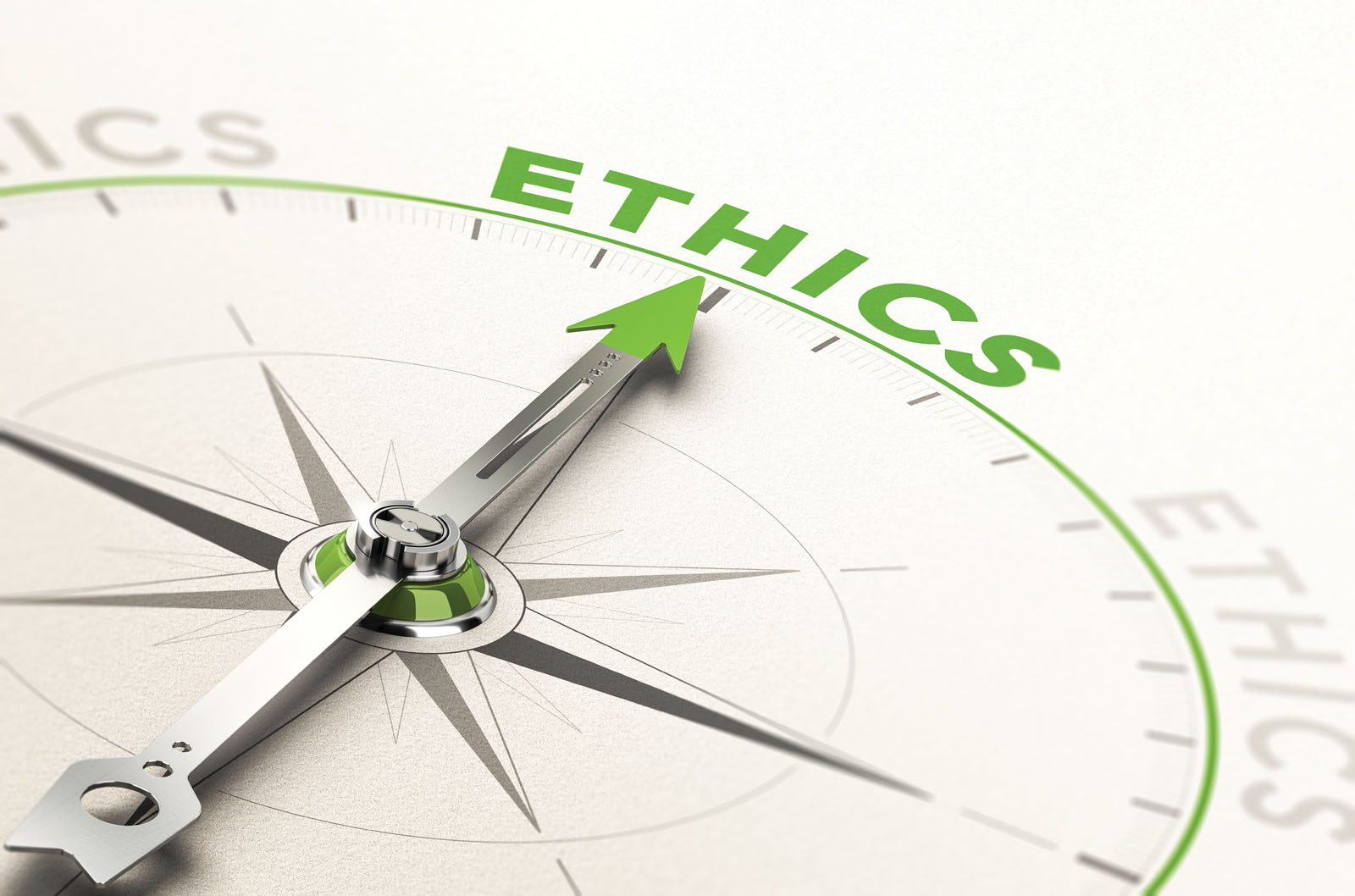
BY KEVIN WOODHOUSE
One potential roadblock that management professionals can face in delivering excellent public service is tough ethical decision-making. My objective here is to present an intriguing theory on how people can prepare to overcome ethical roadblocks.
There are common causes for lapses in ethical judgment that can include ego, power, greed, fear, compulsion, embarrassment, rationalization, or basic lack of a moral compass. My focus is on a strategy for countering misguided rationalization and building a stronger moral compass, which, in turn, should help prevent ethical lapses.
Let’s begin with a personal story, something that happened during a summer vacation not that long ago. My two boys were playing disc golf. We often play improvised courses together in the mountains, where normal golf course holes are trees, rocks, or other features in the landscape. The boys were playing on their own when suddenly they came bursting through the door and said someone had stolen one of their discs. They explained that after teeing off for a hole, which was a boulder pile several properties away from ours that didn’t have a house on it, a man drove up in a truck—it probably was his property—picked up the disc, put it in his truck, and drove off.
I also found out that when the man pulled up and got out, the boys ran away. They knew they were on someone else’s property, and now they were busted.
Or maybe not. What if they had remained calm and walked over to the man, introduced themselves as the kids from a couple properties down, and apologized for being on his property? Perhaps he would have screamed at them anyway.
Or the outcome might have been entirely different, perhaps even getting permission to continue playing their game, as well as the opportunity to meet the property owner.
I recount this story about physically running away to cause us to pause and think about examples in which a leader of an organization ran away from a situation, perhaps not physically but metaphorically.
Taking Responsibility
Think about uncomfortable situations that may seem for leaders easier to ignore, shirk off, walk away from, and forget than they are to confront. The ever-evolving Wells Fargo scandal comes to mind.
But unfortunately, today the list goes on and on of chief executives and public officials who knew about a scandal, shirked their responsibility or worse, and metaphorically ran away. In doing so, it made matters worse for everyone involved.
How can managers train themselves not to run away? It’s a natural human instinct, especially for children, but we’re adults and professionals.
I’d like to suggest a theory that can help us counteract this instinct. It’s a theory that is informed by the book, Public Integrity, by J. Patrick Dobel.1 It begins by looking at the concept of responsibility, and then segues into the concept of integrity. Both of these concepts are strong and deep concepts that are foundational to organizational value sets and codes of ethics, and they are frequently mentioned in response to ethics scandals.
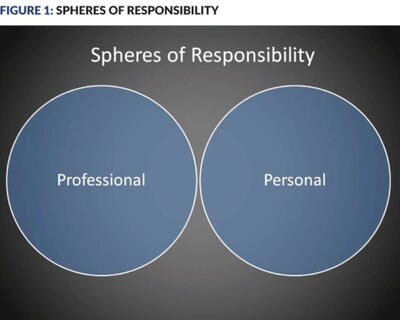
Let’s start with responsibility because organizations are built on responsibility structures, and that is often the first line of inquiry into dissecting ethical misconduct: who knew what, when, and who was responsible for what. Duty, accountability, blame, and discretion are all words associated with responsibility.
Discussions about responsibility often mention personal responsibility or professional responsibility, suggesting these are different nonintersecting spheres (see Figure 1).
We all have different responsibilities in our personal lives as a spouse, parent, child, sibling, friend, community member, or team member of a church or social group than we do in our professional lives. While so critical to the functioning of organizations, the concept of responsibility is, in itself, sort of meaningless; it’s simply that there are actions expected of you and you do them.
A drug lord, terrorist, or other criminal, for example, can act just as responsibly by following their orders from those who control them, as can a great public servant. What is critical are the values that underlie those actions. Figure 2 depicts some common public service and personal values.
Building Integrity
If we focus on the underlying values in our professional sphere of responsibility and our personal sphere of responsibility, I guarantee that most professionals will discover shared values. The action of acknowledging the link between professional responsibility and personal responsibility by self-examining and understanding the shared values between both spheres is an important step in realizing that your professional self and personal self are not entirely distinct, separate spheres (see Figure 3).
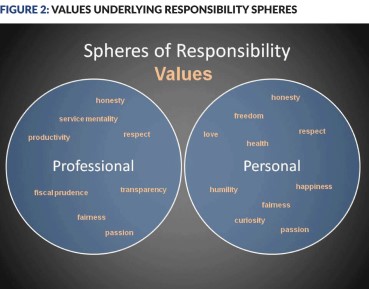
Acknowledging this intersection brings us to the concept of integrity, a powerful component of ethics. By consciously focusing on the values that overlap between your professional and personal lives, you can better integrate the two.
This integration is what helps a person build integrity in life, personally and professionally, strengthening the weave of the decision-making fabric that is authentically you. If you act in the professional realm based on one standard of honesty, but then go home and act according to a different standard of honesty, your core values are not integrated, and you are not being authentic to one side of yourself.
The better you are at understanding and integrating shared values between your personal and professional life, the more integrity you will build, enabling you to be stronger and more authentic in the face of challenging situations.
Shining a Light on Rationalization
These last assertions require further elaboration. How can a failure to align professional and personal values cause problems or, conversely, how can more alignment decrease the likelihood of ethical lapses or shirking responsibility?
The key is that examining our decision-making from different perspectives shines a light on the rationalization behind those decisions and can reveal if there are inconsistent standards between our decision-making in our professional and personal responsibility spheres.
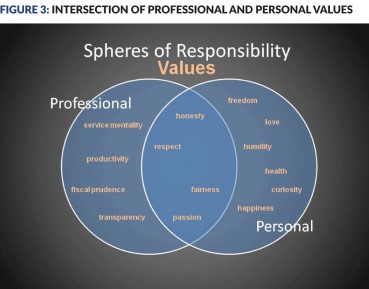
The human brain is incredibly adept at rationalization and often tips into over-rationalization or erroneous rationalization. In regard to the value of honesty, rationalization can lead to refabricating facts, white lying, or pure lying.
Any school teacher or parent probably can cite examples of weird rationalizations around honesty they hear from students and children.
In the workplace, and within the framework of laws, regulations, policies, past practices, and even emotional sensitivity to how employees might react, there are many cases in which professionals rationalize that withholding information and being only partially truthful is the appropriate decision.
In cases of confidential negotiations, personnel matters, or legal discussions, this decision may be required. In cases that don’t have a clear reason for why you might withhold information, however, are you communicating honestly with your employees in the same way that you would expect your spouse or children to communicate with you?
When your child receives a bad grade on a school assignment, you expect an honest answer as to why, so that you can help him or her learn to improve next time. Do you apply this same expectation at work for yourself and your employees in assessing what went wrong on a project in order to improve next time? Or are half-hearted excuses offered, reprimands doled out, and no one learns from their mistakes? In regard to the value of fairness, when delegating tasks to a team of employees, do you do this fairly between team members as you would expect to occur when working with a team of neighbors on a community improvement project in your personal life?
When it comes to fiscal prudence, do you apply the same level of scrutiny and concern to purchases or cost overruns for services in your professional role as you do in your personal life? Or do you view these as different because one is your money and the other is not?
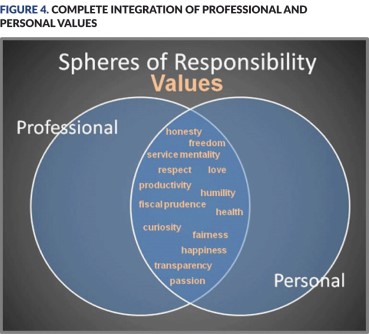
In each of these examples, there may be different rules that apply between the professional and personal roles and so the rationale behind treating them differently may be well-founded. My assertion, however, is that when the rules are not clear, examining a decision-making scenario from both the professional and personal perspective can help to “truth test” your rationalization.
This deliberate exercise—this conscious assessment of values you share between your professional and personal selves—can improve the likelihood that your final decision will be well-founded and authentic, expressing and strengthening your integrity.
Now imagine the strong foundation for your integrity if the integration of values between your professional and personal spheres of responsibility resembles that shown in Figure 4.
Responsibility Theory
This theory is not foolproof in training ourselves to not run away. Sometimes such organizational pressures, as what the former Boeing CEO experienced, may overwhelm the fact that in their personal lives they probably care enormously for the safety of their family and friends. Or consider the cheating scandal recently exposed in baseball that cost both the general manager and manager of the Houston Astros their jobs. After a career built on promoting fair play and honesty as core values of the sport, those values went missing within the team they were leading.
If so, how broken and how divided these different parts of their lives must have felt. Perhaps if they acknowledged the overlap—the integration of values—they would have found more strength for actions they should have taken and professional responsibility they should have shown.
In developing this theory, I went back and reviewed the employee code of ethics for the city of Mountain View, California. Several years ago, I had helped lead a team effort to develop the code when I worked for Mountain View.
A particular phrase in the preamble to the code jumped out at me and is relevant here. It states, “As a city employee, I will be guided by prudent judgment and personal responsibility.” That simple statement integrates the personal and professional spheres of responsibility. It says an employee will own responsibility as the person he or she is, in addition to the professional the person is. It is a stronger commitment than professional responsibility because it is backed by personal values, not just professional obligations.
This discussion of the values that underlie our personal and professional responsibilities and the role they play in building integrity may initially appear to be intuitive or commonsensical. Many employees in the public service sector already have strong moral compasses and are able to confront challenging ethical roadblocks instead of running away from them.
Many already have a strong sense of the values shared in their personal and professional lives from which they derive their integrity and the strength, perhaps unconsciously, to confront tough ethical decisions. It remains true, however, that review of ethical scandals often reveals contradictory values between how an individual views his or her professional responsibilities versus personal responsibilities.
In practice, integrating these spheres of ourselves is more complex than it may seem on the surface. For any professional—athlete, musician, doctor, scientist, police officer, public administrator—constant practice and improvement conditions us for the big challenge when it comes, the big roadblock around the corner.
Strengthening your moral compass is difficult but extremely important work. I hope you will test this theory of integrating your personal and professional spheres of responsibility and that it will help when you confront your next roadblock.
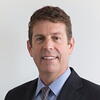
KEVIN WOODHOUSE is city manager of Pacifica, California (kwoodhouse@ci.pacifica.ca.us).
ENDNOTE
1 J. Patrick Dobel. Public Integrity. Johns Hopkins University Press, 2001.
New, Reduced Membership Dues
A new, reduced dues rate is available for CAOs/ACAOs, along with additional discounts for those in smaller communities, has been implemented. Learn more and be sure to join or renew today!
